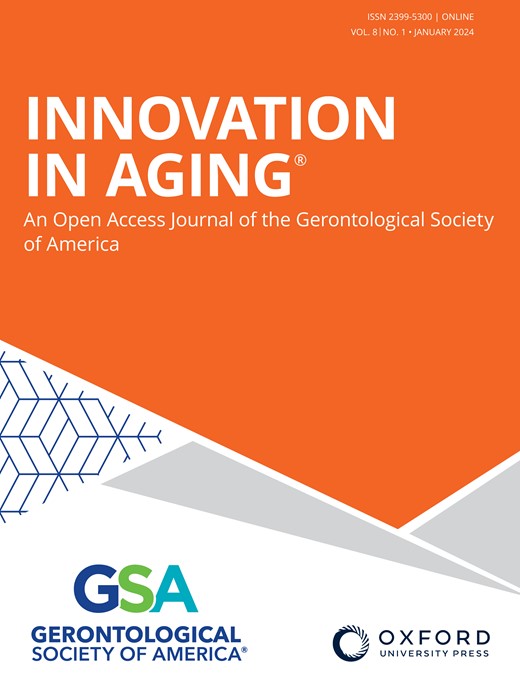认知障碍情况下的预先护理规划忠诚度工具:共享试验
IF 4.9
3区 医学
Q1 GERIATRICS & GERONTOLOGY
引用次数: 0
摘要
摘要 2.与 ADRD 患者及其家人进行高质量的预先护理计划(ACP)谈话本身就具有挑战性。不同程度的认知功能、判断力、参与能力和护理伙伴的参与增加了此类 ACP 对话的复杂性,因此有必要进行灵活的忠实性监测,以适应环境因素。本讲座将重点介绍 ACP 忠实度的测量过程。我们开发了 SHARE ACP 忠诚度核对表,用于测量 ACP 会议期间的协议遵守情况,监控 ACP 主持人可能需要再培训或额外支持的领域,并为分析研究干预的总体影响提供信息。忠实性核对表项目分为三个总体领域:会议设置、ACP 会议主题和引导者沟通技巧。在本研究中,一个由 7 名评分者组成的忠实度裁定小组听取了记录的对话,并对其是否符合协议进行了独立评分。每个核对表项目的评分范围从 0 到 2(0=未完成;1=需要改进;或 2=有效),分数越高,表示遵守程度越高。随着时间的推移,忠实度评分有提高的趋势,这表明存在促进者经验效应。在 63% 的二人对话中,实现了总体忠实度评分≥80% 的目标。根据分量表评分,项目目标最常实现的是沟通技巧分量表,而较少实现的是会议安排分量表。尽管存在一些挑战,但对 SHARE 干预忠诚度的初步评估似乎很有希望,而且有证据表明忠诚度核对表既有效又可靠。本文章由计算机程序翻译,如有差异,请以英文原文为准。
ADVANCE CARE PLANNING FIDELITY TOOL IN THE CONTEXT OF COGNITIVE IMPAIRMENT: THE SHARE TRIAL
Abstract 2. Conducting high-quality advance care planning (ACP) conversations with persons living with ADRD and their family members is inherently challenging. Differing levels of cognitive function, judgment, ability to engage, and care partner involvement adds to the complexity of such ACP conversations, necessitating flexible fidelity monitoring to accommodate contextual factors. This presentation will focus on the process of measuring ACP fidelity. The SHARE ACP fidelity checklist was developed to measure the protocol adherence during ACP meetings, monitor for areas in which ACP facilitators may require re-training or additional support, and to inform analyses of the impact of the overall exposure to the study intervention. The fidelity checklist items are organized into three overarching domains: Meeting Set-Up, ACP Meeting Topics, and Facilitator Communication Skills. For the present study, a fidelity adjudication team from a pool of 7 raters, listened to and independently rated recorded conversations for protocol adherence. Each checklist item is scored ranging from 0 to 2 (0=not done; 1=needs improvement; or 2=effective) with higher scores indicating greater adherence. Fidelity ratings tended to improve over time, suggesting a facilitator experience effect. The goal to achieve an overall fidelity rating of ≥80% was met in 63% of dyad conversations. Based on subscale scores, project targets were most frequently met on the Communication Skills subscale and less frequently accomplished on the Meeting Set Up subscale. Despite some challenges, preliminary assessments of SHARE intervention fidelity appear promising, and evidence suggests the fidelity checklist is both valid and reliable.
求助全文
通过发布文献求助,成功后即可免费获取论文全文。
去求助
来源期刊

Innovation in Aging
GERIATRICS & GERONTOLOGY-
CiteScore
4.10
自引率
0.00%
发文量
72
审稿时长
15 weeks
期刊介绍:
Innovation in Aging, an interdisciplinary Open Access journal of the Gerontological Society of America (GSA), is dedicated to publishing innovative, conceptually robust, and methodologically rigorous research focused on aging and the life course. The journal aims to present studies with the potential to significantly enhance the health, functionality, and overall well-being of older adults by translating scientific insights into practical applications. Research published in the journal spans a variety of settings, including community, clinical, and laboratory contexts, with a clear emphasis on issues that are directly pertinent to aging and the dynamics of life over time. The content of the journal mirrors the diverse research interests of GSA members and encompasses a range of study types. These include the validation of new conceptual or theoretical models, assessments of factors impacting the health and well-being of older adults, evaluations of interventions and policies, the implementation of groundbreaking research methodologies, interdisciplinary research that adapts concepts and methods from other fields to aging studies, and the use of modeling and simulations to understand factors and processes influencing aging outcomes. The journal welcomes contributions from scholars across various disciplines, such as technology, engineering, architecture, economics, business, law, political science, public policy, education, public health, social and psychological sciences, biomedical and health sciences, and the humanities and arts, reflecting a holistic approach to advancing knowledge in gerontology.
 求助内容:
求助内容: 应助结果提醒方式:
应助结果提醒方式:


